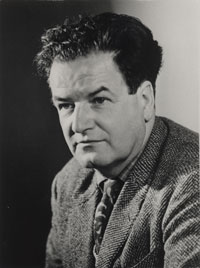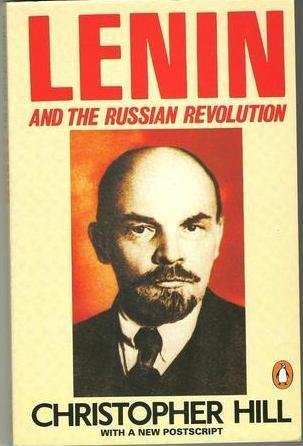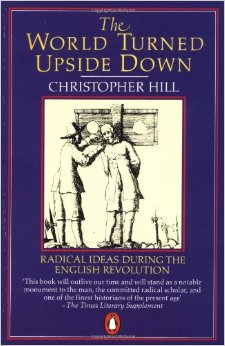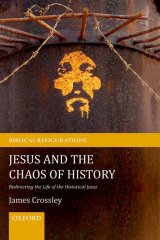Christopher Hill’s Bible (Part 1)
7February 3, 2016 by Harnessing Chaos
The next several posts (part 2 here, part 3 here , part 4 here) will be about the English Marxist historian, Christopher Hill (1912-2003). Hill remains arguably the most famous historian of seventeenth-century England, especially the Civil War(s). For a full discussion of what follows see my ‘Christopher Hill’s World Turned Upside Down’, chapter 2 in Harnessing Chaos: The Bible in English Political Discourse since 1968 (Bloomsbury/T&T Clark, 2014; revised edition with new chapter on events of 2013-15 coming out in April).

Christopher Hill (image from Wikipedia)
Hill’s most famous book, The World Turned Upside Down (1972), was, on one level, a social history of radicalism from below in the mid-seventeenth century. On another level, it reveals thinking about 1968 by way of the 1640s. The following is typical of the blurring:
The radicals, not unexpectedly, came from the younger generation of those who had no aspirations to an official career…Part of the ebullience I have been discussing springs from the youth of the actors. Young men of ability have far more chance of coming top in a revolution…It was a young man’s world while it lasted’ (pp. 188, 366).
Perhaps the most famous chapter in the book is ‘Base Impudent Kisses’ which has phrases such as ‘sexual revolution’, ‘sexual freedom’, and ‘free love’. Liberated Ranters or naked Adamites are one thing but Hill even has sections on those not usually known for sexual playfulness: ‘The Puritan Sexual Revolution’ and ‘Beyond the Puritan Sexual Revolution’. Another occasion where the present is barely hidden is this: ‘Unfortunately Ranter theology leapt ahead of the technical possibilities of their society: equal sexual freedom for both sexes had to wait for cheap and effective methods of birth control’ (p. 321). Hill himself would later reflect that he may have overstated his case and recognised that the cultural circumstances of the time of his writing may have had their influence.
The book, as we will see in the next post, tried to navigate the tensions between radicalism and respectability, just as Hill and other members of the ageing Marxist establishment (e.g. Hobsbawm, Adorno) were forced to do. Hill is more sympathetic to the events surrounding 1968 (e.g. free love, free thought) than others from the Marxist establishment but he shared their dislike for the return of anarchism. Hill also had a culturally conservative streak and was Master of Baliol College, Oxford (1964-1978), which would test his radical loyalties.
Tensions between conservatism and radicalism were not new for Hill. He came from a background of dissent. He became a Marxist and member of the Communist Party in the 1930s, and later a part of the Communist Party Historians’ Group (1946-56), alongside a number of other prominent British historians (e.g. Hobsbawm, E.P. Thompson, Rodney Hilton). What he also shared with a number of the CPHG and Oxford Communists was a Nonconformist upbringing (in the case of Hill, Methodist) which people like Hilton thought was effectively the Communist Party but with God. Friends of Hill likewise noted how the Hill-the-Nonconformist and Hill-the-Communist were hardly dissimilar. A degree of strictness on issues of drinking and smoking were part of Hill’s upbringing and, while aspects of a bohemian lifestyle may have been attractive to Hill in the 1960s, he did not embrace things like drugs. Recollections of austere and serious Communist upbringings are similar and partly show why the playfulness of the 1960s caused problems for the Marxist establishment.
Like many of his contemporaries, Hill turned to Marxism and the Communist Party (he joined in 1934) partly in reaction to the political and economic situation of the 1930s (‘slump, dreadful unemployment, danger of World War II, apparent successes of the USSR – the usual things’) which he recalled were shocking to an English middle-class youth brought up on England’s greatness. The USSR was crucial the development of Hill’s Marxism (he visited in the 1930s, and was a distinguished guest in the 1950s) and it has even been suggested that Hill was a Soviet spy in the 1940s (he even gets an entry in R.C.S. Trahair [ed.], Encyclopedia of Cold War Espionage, Spies, and Secret Operations [2004], pp. 116-18). If he was, Hill did not do a good job of hiding his sympathies because by the time Stalin died in 1953 he was a loyal Communist Party member and a Stalinist. Hill even published Lenin and the Russian Revolution (1947). As a hagiography of Lenin that effectively repeats the Communist Party line (especially the continuity between Lenin and Stalin, with Trotsky treated more negatively) in the popular Teach Yourself History series, it is perhaps easy enough to appreciate the bemusement of the series editor A.L. Rowse. But it was an article published in 1953 that would later especially embarrass Hill. In ‘Stalin and the Science of History’, Modern Quarterly 8 (1953), pp. 198-212 (209), he wrote that Stalin was ‘a very great and penetrating thinker…all countries will always be deeply in his debt’.
As a hagiography of Lenin that effectively repeats the Communist Party line (especially the continuity between Lenin and Stalin, with Trotsky treated more negatively) in the popular Teach Yourself History series, it is perhaps easy enough to appreciate the bemusement of the series editor A.L. Rowse. But it was an article published in 1953 that would later especially embarrass Hill. In ‘Stalin and the Science of History’, Modern Quarterly 8 (1953), pp. 198-212 (209), he wrote that Stalin was ‘a very great and penetrating thinker…all countries will always be deeply in his debt’.
Hill (unlike Hobsbawm) left the Communist Party in 1957 after disputes over greater Party democracy and against the backdrop of others leaving after the Khrushchev speech and the crushing of the Hungarian uprising in 1956. The Stalinism was to be dropped but he remained a Marxist, would continue to defend Marxism in his later career, and regarded the Communist Party Historians’ Group as the greatest stimulus he had known. As with figures like Raphael Samuel, a nostalgia for a lost Party-led Communism was not easy to shake off.
As this background might suggest, 1968 posed problems for figures such as Hill in that cases could be made (and were) that they should both endorse and oppose what was happening. These tensions are played out (consciously or unconsciously) in Hill’s writing on the English revolution. For Hill, with qualifications duly noted, what happened in seventeenth-century England was a revolution as significant as those as France or Russia. Hill argued that there were two revolutions. The revolution that succeeded was effectively bourgeois, and certainly so in its consequences. The power of Church and Crown was kept in check by Parliament and created a state ready for the emergence of capitalism and empite and an international empire. The revolution that failed was more radically democratic and threw up ideas from proto-Communism and free love to ideas questioning a creator God and the existence of Hell. According to Hill, this radical revolution was important for initially boosting the bourgeois revolution and the historically shocking act of regicide but once this new bourgeois power was consolidated, the radical revolution had to be supressed.
Hill discussed his radical revolution in The World Turned Upside Down. Against the backdrop of 1960s iconoclasm, Hill wanted to rescue the seventeenth-century radicals and radicalism (e.g. Gerrard Winstanley, Abiezer Coppe, James Nayler, Tyranipocrit Discovered, Quakers, Diggers, Ranters. Levellers etc.) from the label of ‘lunatic fringe’. As touched upon above, the book discusses antinomianism, hostility to wealth, anticlericalism, antiroyalism, extension of democratic rights, land redistribution, class consciousness, idealism, utopianism, collectives, sexual freedom etc. Radical sentiments, which could be as much about the student-led radicalism of 1960s as the 1640s, come through implicitly in The World Turned Upside Down on almost every page. But what also comes through is a defence of such figures as serious intellectuals in their own right. And to do this, Hill turned to the Bible.
Against the backdrop of 1960s iconoclasm, Hill wanted to rescue the seventeenth-century radicals and radicalism (e.g. Gerrard Winstanley, Abiezer Coppe, James Nayler, Tyranipocrit Discovered, Quakers, Diggers, Ranters. Levellers etc.) from the label of ‘lunatic fringe’. As touched upon above, the book discusses antinomianism, hostility to wealth, anticlericalism, antiroyalism, extension of democratic rights, land redistribution, class consciousness, idealism, utopianism, collectives, sexual freedom etc. Radical sentiments, which could be as much about the student-led radicalism of 1960s as the 1640s, come through implicitly in The World Turned Upside Down on almost every page. But what also comes through is a defence of such figures as serious intellectuals in their own right. And to do this, Hill turned to the Bible.







I love ‘The World Turned Upside Down’ and am especially proud to share my town of birth with Gerrard Winstanley. It is to the works of Milton though that I turn for the most lofty ideas of 17th C UK though!? Hobbes too fascinates me. Maybe I just love the muscularity of 17th C English?
LikeLike
You are fellow northwesterner, then. In that case I think I will say something on Hill and Milton. Just for you.
LikeLike
[…] 1 available here. All Hill posts based on the chapter, ‘Christopher Hill’s World Turned Upside Down’, in […]
LikeLike
[…] 1 available here, Part 2 available here. All Hill posts based on the chapter, ‘Christopher Hill’s World Turned […]
LikeLike
[…] Hill was a prolific writer and wrote a lot on the uses of Bible, including The English Bible and the Seventeenth-Century Revolution (1993). There is an extended discussion of Hill’s use of the Bible in his academic work at Harnessing Chaos. […]
LikeLike
[…] 1 available here, Part 2 available here, Part 3 available here. All Hill posts based on the chapter, […]
LikeLike
[…] Christopher Hill’s Bible (Part 1) […]
LikeLike